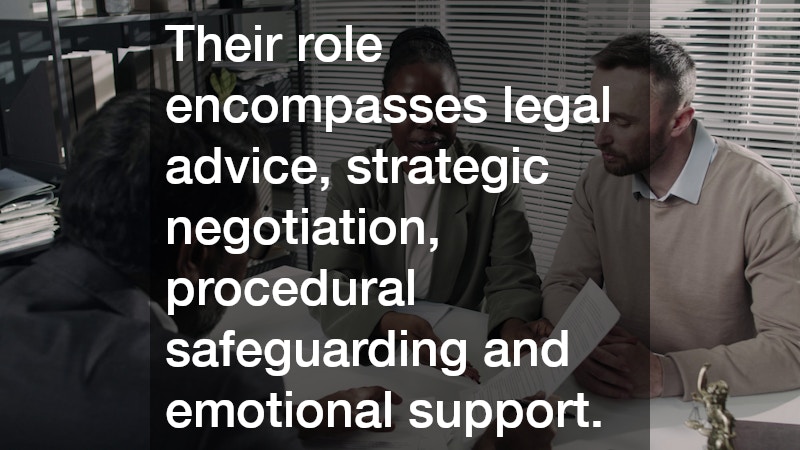What Does a Criminal Law Solicitor Do?
When faced with legal charges, one of the first professionals people turn to is a criminal law solicitor. This legal expert plays a vital role in the justice system by defending the rights of individuals accused of criminal offences.
From providing legal advice to representing clients in court, their work is complex, highly skilled and often critical in determining the outcome of a case. Understanding what a criminal law solicitor does offers valuable insight into the criminal justice process and how accused individuals are supported through it.
Legal Advice and Case Assessment
A criminal law solicitor’s work typically begins the moment a client is accused of or charged with a criminal offence. Whether the matter involves a minor traffic infringement or a serious indictable offence, solicitors assess the case thoroughly to provide accurate legal advice. This involves reviewing police statements, examining evidence and identifying any procedural errors or breaches of rights.
Clients rely on their solicitor for clear and realistic guidance about the possible outcomes of their case. A key part of this early interaction involves discussing whether the accused should plead guilty or not guilty. Based on the evidence available, the solicitor advises on the strength of the prosecution’s case, potential defences and the likely consequences of different legal strategies.
Representation in Police Interviews and Court Proceedings
One of the most critical responsibilities of a criminal law solicitor is representing clients during police interviews. This ensures the accused does not inadvertently say something that could be used against them later in court. The solicitor safeguards the client’s legal rights and ensures any questioning is conducted fairly and within legal bounds.
Should the matter progress to court, the solicitor plays a central role in preparing and presenting the defence. In lower courts such as the Magistrates’ Court, the solicitor may advocate on behalf of the client, presenting arguments, cross-examining witnesses and delivering closing statements. In more serious matters heard in higher courts, such as the District or Supreme Court, the solicitor works closely with barristers, providing instructions and managing case preparation.
Negotiating with Prosecutors
Negotiation is another significant part of a criminal law solicitor’s role. In many cases, it is possible to reach an agreement with the prosecution that avoids the need for a contested trial. This could involve negotiating a plea deal where the accused pleads guilty to a lesser charge in exchange for a more lenient sentence. The solicitor’s aim is always to achieve the best possible outcome for their client, balancing legal strategy with a practical understanding of the court’s approach to sentencing.
These negotiations require not only a solid understanding of the law but also strong interpersonal and communication skills. Criminal law solicitors must present their client’s case persuasively, demonstrating why a particular resolution is fair and just. They must also be able to anticipate the prosecution’s likely response and adjust their approach accordingly.
Client Support and Confidentiality
Dealing with criminal charges is an incredibly stressful experience and criminal law solicitors often serve as a key source of support for their clients. They help clients navigate the often confusing and intimidating legal system, answering questions and explaining proceedings in plain language. Solicitors also liaise with family members, court staff and other legal professionals on the client’s behalf, ensuring all aspects of the case are managed effectively.
Confidentiality is a cornerstone of this relationship. Clients must be able to speak freely and honestly with their solicitor, knowing that everything shared is protected by legal privilege. This trust allows solicitors to build a complete picture of the case and provide the most effective representation possible.
Legal Research and Case Preparation
Behind every successful courtroom appearance is a great deal of preparation. A criminal law solicitor spends significant time researching relevant case law, preparing legal documents and gathering evidence. They may engage expert witnesses, obtain forensic reports or track down CCTV footage to support their client’s version of events.
Thorough case preparation can mean the difference between conviction and acquittal. From reviewing complex legal precedents to managing timelines and documentation, this behind-the-scenes work is essential to the solicitor’s role.
Upholding Justice and Legal Integrity
At its core, the work of a criminal law solicitor is about more than defending individual clients—it’s about upholding the principles of justice. Everyone has the right to a fair trial and solicitors ensure that this right is respected, regardless of the nature of the charges or the individual’s background. By challenging unlawful procedures, advocating for fair treatment and demanding high standards of evidence, criminal law solicitors play a crucial role in maintaining public trust in the legal system.
By identifying systemic issues and inconsistencies in the application of the law, solicitors may participate in public advocacy or provide input into policy development. This further underscores their importance not only to their clients but to the functioning of society as a whole.
A criminal law solicitor is much more than a courtroom advocate. Their role encompasses legal advice, strategic negotiation, procedural safeguarding and emotional support. They ensure that every person facing criminal charges is treated fairly and represented competently. With a strong foundation in law and a commitment to justice, criminal law solicitors remain essential to the proper functioning of Australia’s legal system. Whether managing minor matters or defending against serious allegations, their work consistently reflects the values of fairness, integrity and diligence.
.





Post Comment